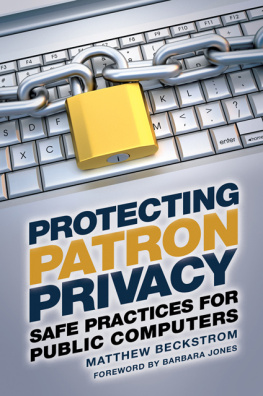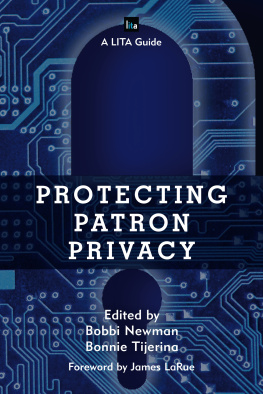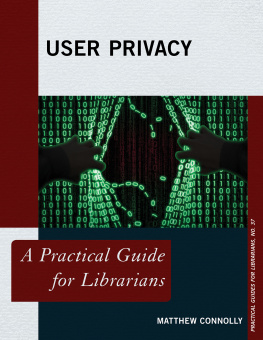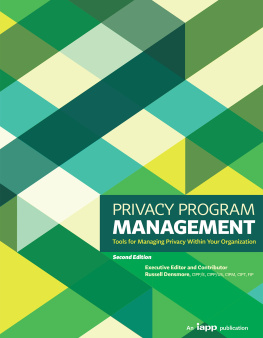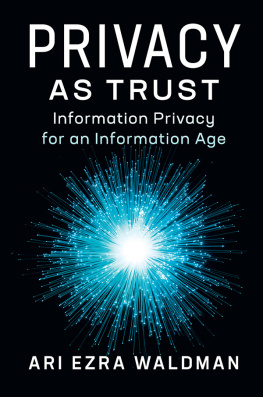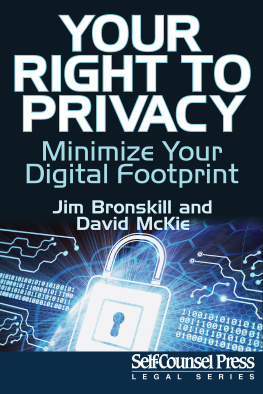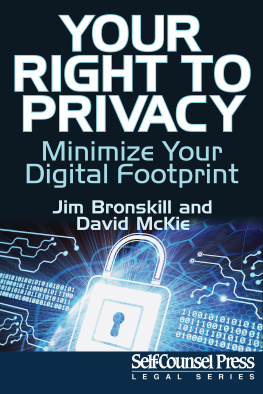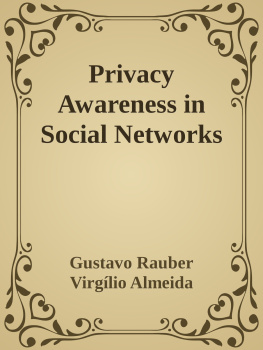Library Patrons Privacy

Questions and Answers
Sandra J. Valenti, Brady D. Lund, and Matthew A. Beckstrom

Copyright 2022 by Sandra J. Valenti, Brady D. Lund, and Matthew A. Beckstrom
All rights reserved. No part of this publication may be reproduced, stored in a retrieval system, or transmitted, in any form or by any means, electronic, mechanical, photocopying, recording, or otherwise, except for the inclusion of brief quotations in a review, without prior permission in writing from the publisher.
Library of Congress Cataloging-in-Publication Data
Names: Valenti, Sandra J., author. | Lund, Brady, 1994- author. | Beckstrom, Matthew, author.
Title: Library patrons privacy : questions and answers / Sandra J. Valenti, Brady D. Lund, and Matthew A. Beckstrom.
Description: First edition. | Santa Barbara, California : Libraries Unlimited, [2022] | Includes bibliographical references and index.
Identifiers: LCCN 2021016460 (print) | LCCN 2021016461 (ebook) | ISBN 9781440874109 (paperback ; acid-free paper) | ISBN 9781440874116 (ebook)
Subjects: LCSH: Library legislationUnited States. | Data protectionLaw and legislationUnited States. | Library recordsLaw and legislationUnited States. | Internet access for library usersLaw and legislationUnited States. | Library usersLegal status, laws, etc.United States.
Classification: LCC KF4319.P75 V35 2022 (print) | LCC KF4319.P75 (ebook) | DDC 342.7308/58dc23
LC record available at https://lccn.loc.gov/2021016460
LC ebook record available at https://lccn.loc.gov/2021016461
ISBN: 978-1-4408-7410-9 (paperback)
978-1-4408-7411-6 (ebook)
25 24 23 22 211 2 3 4 5
This book is also available as an eBook.
Libraries Unlimited
An Imprint of ABC-CLIO, LLC
ABC-CLIO, LLC
147 Castilian Drive
Santa Barbara, California 93117
www.abc-clio.com
This book is printed on acid-free paper 
Manufactured in the United States of America
For my husband, Dale, whose unfailing support has helped me overspend on electronics for decades.
Sandra J. Valenti
I am appreciative to everyone who supports the tremendous opportunities I have to learn and contribute to the library profession and library and information science research.
Brady D. Lund
I would like to dedicate this book to all the libraries and librarians fighting every day to protect the privacy of every library user. I have to thank my coauthors, who really did the lions share of the work for this book and for their support. Of course, none of this would be possible without the love and support of my amazing wife. Thank you!
Matthew A. Beckstrom
Contents
Acknowledgments
We would like to acknowledge the contributions of the reviewers and editors of this book for helping to see it come to fruition. Thank you!
Introduction
The Importance of Evidence-Based Practice in Information Policy
Hello reader! Welcome to this discussion of some of the biggest ethical crises in information privacy faced by library patrons today. You may be wondering, what sets this book apart from other library privacy books available today? Simple. This is not a book that tells you this is what we say is best and you must do it. Rather, it is a book written with a firm belief in evidence-based practice, the idea that professionals should stay abreast of current research and trends in practice in order to inform best practice at their own institutions. Evidence-based practice first emerged in the medical professions, where it was decided that research, personal wisdom, and insight about a specific situation was more likely to result in positive medical outcomes than tradition and personal convictions.
Following this belief in evidence-based practice, this book synthesizes librarian opinions, library policies, case studies, empirical research for library and information science and other fields, American Library Association publications, privacy philosophy and a bit of our own opinions, developed while reading all this literature. This book does not say this is definitely the answer for your library; it says, this is what researcher X said, library Y did effectively, and the ALA suggests. We all know that if you have worked at one library, then you have worked at one library. Unless you want to pay for us to personally visit your library and solve all its privacy problems based on its unique status and needs (which we are more than happy to do), this is the next best thing. Each chapter of this book is a complete review and analysis of a different library privacy issue. As the book progresses, we introduce increasingly more complex technologies and issues.
Why focus on privacy? Librarians consistently regard privacy as an incredibly pressing concern (Zimmer 2014).these trends. Privacy policy is also an area that is particularly amenable to evidence-based practice. We can see what a librarys policy is, and we can also see how well that policy works. If an idea works for dozens of libraries of different type (public, academic, corporate), then it is easy to argue that it will work for your library as well. Information privacy is also a highly interdisciplinary concern, which takes concepts from the information sciences and applies them to librariesthis is a concept that appeals to the authors interests and to library and information science researchers. Most importantly, we think the topic is pressing and insufficiently discussed in the literature and implemented in practice, so we want to highlight and hopefully help to remedy this situation.
THE PURPOSE OF POLICY
Policy is a major focus of this book, as policy both defines library actions and protects the library from attacks by those who may wish to undermine its decision-making authority. Policy is often developed by a committee. At public libraries, this is typically the library boarda group of elected or appointed volunteers who take part in the governance of the library. At academic libraries, this is often a committee comprised of library and college/university leadership. Policy is developed to set a precedent, to provide something to look to, rather than make up decisions on the spot. Like this book, policy is something physical that you can point to as justification for your actions (and with any luck, this book will be influential enough to inform some library policies). Policy allows libraries to divert attention from the library employees to an inanimate object, the policy and library board/governance committee. Like with a theoretical framework used in research, a policy makes logical order of where the librarys rules originate and why.
Policy, however, is not the sole focus of this book. There are, in fact, many cases in which policy cannot accurately anticipate how an incident will unfold, or where the level of ambiguity in a situation cannot be captured or explained in a written statement. It is in these cases that this book draws on narratives from those who have experienced this type of situation, or on ethical conceptions that provide some guidance on how to respond.
By the way, if you do discover some policies in this book that you would like to use in your library, we are sure that the library from which the policy originates would be glad to let you use them, but please do ask for permission first! After all, all website content is copyrighted, so if you use it you will either need to attribute it to the creator (as we do in this book) or ask for permission to use the copyrighted content. Do not simply copy a policy from another librarys website and say okay, done! We are sure that you readers know this, but consider it a legal disclaimer on our part (akin to a do not steal jewelry disclaimer in a book about excellent jewels from around the world).
Next page

